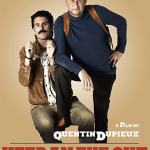A man refuses all assistance from his daughter as he ages. As he tries to make sense of his changing circumstances, he begins to doubt his loved ones, his own mind and even the fabric of his reality.
Pam says:
Dementia. Millions of Americans suffer directly and indirectly from this devastating cognitive disease, but never has a film so eloquently allowed us to step into the shoes and mind of someone with this degenerative disease as in “The Father,” starring Anthony Hopkins. Written by Florian Zeller for the stage with critical acclaim, the playwright strikes out into the world of screenwriting and filmmaking for the first time so that we can see the world through the victim’s eyes. It’s a dizzying portrayal that ultimately changes how you understand and interact with Grandma, Grandpa, Mom, or Dad.
We meet the cantankerously charming older man, Anthony (Hopkins) in his apartment as his daughter Anne (Olivia Colman) relentlessly and unsuccessfully tries to help him remember recent events and comprehend what’s to come. Anthony has gone through plenty of caretakers as is evidenced by his newest one, Laura (Imogen Poots) who better understands this man than his own daughter. Day by day, Anthony’s world begins to spin out of control, but he’s grasping for something to steady himself. With nothing anchored, he too begins to cognitively fall, taking us with him.
Anne, attempting to care for her father and somehow balance a life and career of her own is overwhelming, but we see this from Anthony’s perspective. It feels as if we are seated next to him as we watch his daughter struggle with who her father has become. Understanding that their relationship is riddled with turmoil from her youth, the result is compounded at this stage of life for both of them. Loyalty and love is tested as Anne watches her strong, independent father become quite the opposite.
Walking in Anthony’s shoes, we experience what he does; the confusion of person, place, and time and the misunderstanding of information he receives. The small details subtly and profoundly change in his world—room colors, decor, even people—adding the element of confusion which throws off our perception, too. The apartment or flat, a character in itself, is the location of most of the film and we are in a captive environment that unexpectedly changes moment by moment or day by day. The walls begin to close in, uncertain as to the reality of the situation. This is exactly what Anthony is experiencing, but we realize that his reality is the only reality that matters. Anne, however, cannot accept this. “Remember, Dad?” she says repeatedly. A question that becomes a trigger and I am reminded of working with patients in nursing homes, including my own mother and father-in-law, of what not to say. Their reality is the only reality and we must live in that. After several viewings of this film, I catch more and more minute changes creating an overwhelming sense of empathy for anyone who has dementia.
The role of Anthony was written for Hopkins, according to Zeller who presented the film at the 2020 Sundance Film Festival. Hopkins takes on this challenging role and meets it with the expertise you would expect from this consummate actor. Hopkins’ gives his character a wit and brilliance which bubbles beneath the surface of his pained eyes, taking us into his character’s emotional status. Anthony understands that things aren’t right, but his intellect creates excuses to those with whom he interacts, covering up his “mistakes” and placing the blame on others. Lashing out and using his razor-sharp tongue to slice open the heart of his daughter is just one example of the pain he feels and inflicts. And yet, there are moments of lucidity and a glimmer of who this man was at one time. A twinkle in his eyes with a quick witted comment rises to the surface as if he’s flipping a switch and turning on the synapses. And just as quickly as it’s turned on, the switch is turned off and those wires become crossed, plunging him back into a world we do not know. Hopkins’ masterful performance is unparalleled as he gives us access to his character’s cognitive demise.
The entire cast is captivating, seeming to intuitively know the pain those who endure seeing a loved one in this situation. Colman’s dexterity elicits an evocative portrayal of Anthony’s daughter as she richly explores the open wounds of the past compounded by the onslaught of the present lashes. Of course, Zeller’s brilliant script and direction is at the core of the film readying a talented cast to give us commandingly powerful story.
Dementia is a disease that touches almost every family on some level. “The Father” creates empathy in a world frequently misunderstood and with an astute storyline, exceptional performances, and adroitly nimble direction. Perhaps it will change your world from a frustrating one to one filled with compassion and understanding.
4 Stars
Chuck says:
The past year saw a spate of films that delved into the mental state of their damaged characters. “Relic” looked at dementia through the lens of a horror movie, using an ever-changing, ever-shrinking haunted house as a metaphor for the fractured mind of its protagonist. “I’m Thinking of Ending Things” was an examination of conflicting memories and the way in which they shift over time, brutally affecting our perception of today. Meanwhile, “Possessor” saw an assassin infiltrate the minds of close associates of her respective targets, a process that has an increasingly damaging effect on her own psyche.
Obviously, mental health is on the mind of many progressive filmmakers; I’ll leave figuring out why to sociologists smarter than me. However, the best of the bunch is Florian Zeller’s “The Father,” an adaptation of his 2011 play that effectively puts the viewer in the shoes of the titular character, an elderly man suffering from Alzheimer’s disease who suspects his grasp on the world is slipping away from him.
Anthony Hopkins delivers perhaps his best performance as Anthony, a retiree living with his daughter Anne (Olivia Coleman) in a London flat. He spends his days reading, wandering around their roomy apartment and driving off caregivers, accusing them of theft, taxing their patience until they reach their breaking point. Anne realizes that her father’s mind is slipping, his mood is altered and moments of confusion are becoming more frequent. Because of all this, she is reluctant to tell him that she plans to move to Paris with her boyfriend and that he will be living in a care facility henceforth.
This sends the old man into a spiral, at one moment angry, the next apologetic and at times charming. Anthony’s emotions are mercurial, a response to his confusion about his surroundings. Upon entering a room, he encounters a man (Mark Gatiss) we assume is Anne’s husband (he’s not) who keeps him at arm’s length. Minutes pass and Anthony is face-to-face with Paul (Rufus Sewell), another man who may or may not belong in Anthony’s flat, but brings an unwanted sense of menace to the surroundings.
To give away any more would dull the film’s devastating impact. There’s a very subtle shell game at play here that allows us to see the world from Anthony’s perspective, as we find ourselves as confused as he is, asking the same questions he does regarding the time, place and persons he meets. That the confines of his flat shift and changes as well, only adds to the mystery and terror of the situation.
While the focus may be on Anthony, Zeller wisely shows the impact dementia has on the family members of the afflicted. Coleman matches Hopkins step for step, conveying her character’s sense of conflict, guilt and anger in a deft manner that cuts straight to the heart. Their scenes together contain such intimacy, they’re almost unbearable to watch. And yet, we must as “The Father” brilliantly addresses the humanity and frailty in us all, it’s singular approach achieving a sense of empathy that proves startling, frighting and unforgettable.
4 Stars




